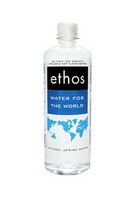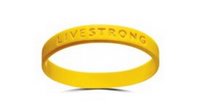
Bono and fellow activist Bobby Shriver have launched (Product)RED, a co-brand of cause-related products which put portions of your purchases towards doing a greater good beyond boosting shareholder value.
Per Bobby Shriver's comments on (Product)RED, "we came up with the idea of a brand that would create a sustainable flow of money to the Global Fund to help fight AIDS in Africa by tapping in to the world of commerce."
The concept is simple: buy (RED) and you get a product just as good as the competition while at the same time ensuring money gets to AIDS programmes in Africa. But really, you get an enviable fashion badge to display where your heart is.
Shriver goes on to state: "The equation of mutual self-interest is balanced and some may question it, but it’s time to get real. The traditional routes for giving are not sustainable over the long term and it’s time for big business to step up to the plate and see for themselves that doing good is good business."
(Product)RED has helped convince companies like American Express, Giorgio Armani, Gap and Converse to design and sell co-branded products, that as the name implies, will be colored red, that raise awareness and money for The Global Fund for AIDS, Tuberculosis and Malaria. Companies commit to contributing a percentage of sales, and the funds are used for AIDS-related programs for women and children in Africa. Join Red at http://www.joinred.com/
Join Red at http://www.joinred.com/
AKI COMMENT: From Livestrong, to Ethos Water, to Prius, to Goodwill, the New Do-Goodery has been gaining major ground as the "cool" thing to do.
I applaud the market-saavy and better-mouse-trappery that "cause" brands are increasingly adopting. How refreshing that causes are learning to stop begging and settling for chump change from the weekend brownie sale, and instead, are tapping the big money by speaking to consumers on the terms they can relate to: fashion, image, ego, reward, and commerce.
Some brands, like Goodwill, are sourcing new profits by SIMPLY PROVIDING A BETTER SERVICE. And ain't that cool for a change? Nothing so mystically "hip" here, just plain better organzed stores, better fixtures, and better displays. Equals more shoppers, and less embarrassed shoppers who now feel good about the stuff they bought. Good cause or not, these are the minimums we ask of any brand seeking to grab share of my wallet. And it is high time the "good guys" caught on to these realities. Obviously any fashionable "hot trend", like driving a hybrid or doning a Livestrong band, can just as quickly become "unhot" as too many people adopt the cool trend (nothing new for for-profit brands). But let's be real, most causes have the core objective of gaining awareness in a world of mental overload. Cool Fashion Do-Goodery at least makes a real measureable impact on culture (short-term or not). The fact that they have to start working harder to maintain or repeat the cool effect is, well, just the costs of doing business that we all face.
Obviously any fashionable "hot trend", like driving a hybrid or doning a Livestrong band, can just as quickly become "unhot" as too many people adopt the cool trend (nothing new for for-profit brands). But let's be real, most causes have the core objective of gaining awareness in a world of mental overload. Cool Fashion Do-Goodery at least makes a real measureable impact on culture (short-term or not). The fact that they have to start working harder to maintain or repeat the cool effect is, well, just the costs of doing business that we all face.
"Real" brands will soon have to wake up, as well as up-the-ante as the Do-Gooders get saavier, and cooler, and credibly hip. I'd expect more Do-Gooders to recruit more of the big brains in marketing and design and fashion, that were once exclusive to "real brands". And that is good for all. Do-Goodery is evolving past the unenviable lifestyle of confrontation, guilt and begging to a brand model that gains sustainable mass interest and commitment.
Share ideas that inspire. FALLON PLANNERS (and co-conspirators) are freely invited to post trends, commentary, obscure ephemera and insightful rants regarding the experience of branding.
Saturday, March 04, 2006
Trend: Conscious Consumption: (Product)RED
Subscribe to:
Post Comments (Atom)















1 comment:
It's certainly interesting how do-goodery has either(depending on your point of view)
1) grown up, got pragmatic and realized that they can get more money to change the world by co-oping personal and corporate gain.
2) totally sold out and become a marketing tool that in truth does little to change or improve the world, leaving structural inequalities in place, and just simply making people feel better about them.
Personally i think it's a bit of both. But professionally I've noticed for a long time that where brands have obsessed about 'organic' as a trend to jump on they would be better served longterm looking at fair-trade and sustainability issues in tandem.
Post a Comment